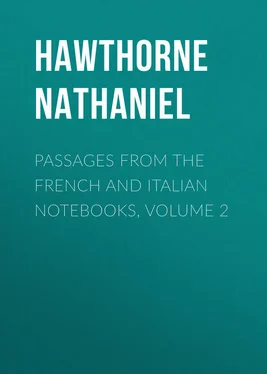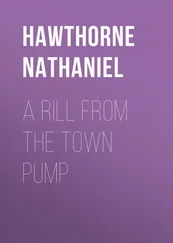Nathaniel Hawthorne - Passages from the French and Italian Notebooks, Volume 2
Здесь есть возможность читать онлайн «Nathaniel Hawthorne - Passages from the French and Italian Notebooks, Volume 2» — ознакомительный отрывок электронной книги совершенно бесплатно, а после прочтения отрывка купить полную версию. В некоторых случаях можно слушать аудио, скачать через торрент в формате fb2 и присутствует краткое содержание. Жанр: literature_19, foreign_antique, foreign_prose, на английском языке. Описание произведения, (предисловие) а так же отзывы посетителей доступны на портале библиотеки ЛибКат.
- Название:Passages from the French and Italian Notebooks, Volume 2
- Автор:
- Жанр:
- Год:неизвестен
- ISBN:нет данных
- Рейтинг книги:3 / 5. Голосов: 1
-
Избранное:Добавить в избранное
- Отзывы:
-
Ваша оценка:
- 60
- 1
- 2
- 3
- 4
- 5
Passages from the French and Italian Notebooks, Volume 2: краткое содержание, описание и аннотация
Предлагаем к чтению аннотацию, описание, краткое содержание или предисловие (зависит от того, что написал сам автор книги «Passages from the French and Italian Notebooks, Volume 2»). Если вы не нашли необходимую информацию о книге — напишите в комментариях, мы постараемся отыскать её.
Passages from the French and Italian Notebooks, Volume 2 — читать онлайн ознакомительный отрывок
Ниже представлен текст книги, разбитый по страницам. Система сохранения места последней прочитанной страницы, позволяет с удобством читать онлайн бесплатно книгу «Passages from the French and Italian Notebooks, Volume 2», без необходимости каждый раз заново искать на чём Вы остановились. Поставьте закладку, и сможете в любой момент перейти на страницу, на которой закончили чтение.
Интервал:
Закладка:
The weather is very hot now, – hotter in the sunshine, I think, than a midsummer day usually is in America, but with rather a greater possibility of being comfortable in the shade. The nights, too, are warm, and the bats fly forth at dusk, and the fireflies quite light up the green depths of our little garden. The atmosphere, or something else, causes a sort of alacrity in my mind and an affluence of ideas, such as they are; but it does not thereby make me the happier. I feel an impulse to be at work, but am kept idle by the sense of being unsettled with removals to be gone through, over and over again, before I can shut myself into a quiet room of my own, and turn the key. I need monotony too, an eventless exterior life, before I can live in the world within.
June 15th. – Yesterday we went to the Uffizi gallery, and, of course, I took the opportunity to look again at the Venus de' Medici after Powers's attack upon her face. Some of the defects he attributed to her I could not see in the statue; for instance, the ear appeared to be in accordance with his own rule, the lowest part of it being about in a straight line with the upper lip. The eyes must be given up, as not, when closely viewed, having the shape, the curve outwards, the formation of the lids, that eyes ought to have; but still, at a proper distance, they seemed to have intelligence in them beneath the shadow cast by the brow. I cannot help thinking that the sculptor intentionally made every feature what it is, and calculated them all with a view to the desired effect. Whatever rules may be transgressed, it is a noble and beautiful face, – more so, perhaps, than if all rules had been obeyed. I wish Powers would do his best to fit the Venus's figure (which he does not deny to be admirable) with a face which he would deem equally admirable and in accordance with the sentiment of the form.
We looked pretty thoroughly through the gallery, and I saw many pictures that impressed me; but among such a multitude, with only one poor mind to take note of them, the stamp of each new impression helps to obliterate a former one. I am sensible, however, that a process is going on, and has been ever since I came to Italy, that puts me in a state to see pictures with less toil, and more pleasure, and makes me more fastidious, yet more sensible of beauty where I saw none before. It is the sign, I presume, of a taste still very defective, that I take singular pleasure in the elaborate imitations of Van Mieris, Gerard Douw, and other old Dutch wizards, who painted such brass pots that you can see your face in them, and such earthen pots that they will surely hold water; and who spent weeks and months in turning a foot or two of canvas into a perfect microscopic illusion of some homely scene. For my part, I wish Raphael had painted the "Transfiguration" in this style, at the same time preserving his breadth and grandeur of design; nor do I believe that there is any real impediment to the combination of the two styles, except that no possible space of human life could suffice to cover a quarter part of the canvas of the "Transfiguration" with such touches as Gerard Douw's. But one feels the vast scope of this wonderful art, when we think of two excellences so far apart as that of this last painter and Raphael. I pause a good while, too, before the Dutch paintings of fruit and flowers, where tulips and roses acquire an immortal bloom, and grapes have kept the freshest juice in them for two or three hundred years. Often, in these pictures, there is a bird's-nest, every straw perfectly represented, and the stray feather, or the down that the mother-bird plucked from her bosom, with the three or four small speckled eggs, that seem as if they might be yet warm. These pretty miracles have their use in assuring us that painters really can do something that takes hold of us in our most matter-of-fact moods; whereas, the merits of the grander style of art may be beyond our ordinary appreciation, and leave us in doubt whether we have not befooled ourselves with a false admiration.
Until we learn to appreciate the cherubs and angels that Raphael scatters through the blessed air, in a picture of the "Nativity," it is not amiss to look at, a Dutch fly settling on a peach, or a bumblebee burying himself in a flower.
It is another token of imperfect taste, no doubt, that queer pictures and absurd pictures remain in my memory, when better ones pass away by the score. There is a picture of Venus, combing her son Cupid's head with a small-tooth comb, and looking with maternal care among his curls; this I shall not forget. Likewise, a picture of a broad, rubicund Judith by Bardone, – a widow of fifty, of an easy, lymphatic, cheerful temperament, who has just killed Holofernes, and is as self-complacent as if she had been carving a goose. What could possibly have stirred up this pudding of a woman (unless it were a pudding-stick) to do such a deed! I looked with much pleasure at an ugly, old, fat, jolly Bacchus, astride on a barrel, by Rubens; the most natural and lifelike representation of a tipsy rotundity of flesh that it is possible to imagine. And sometimes, amid these sensual images, I caught the divine pensiveness of a Madonna's face, by Raphael, or the glory and majesty of the babe Jesus in her arm, with his Father shining through him. This is a sort of revelation, whenever it comes.
This morning, immediately after breakfast, I walked into the city, meaning to make myself better acquainted with its appearance, and to go into its various churches; but it soon grew so hot, that I turned homeward again. The interior of the Duomo was deliciously cool, to be sure, – cool and dim, after the white-hot sunshine; but an old woman began to persecute me, so that I came away. A male beggar drove me out of another church; and I took refuge in the street, where the beggar and I would have been two cinders together, if we had stood long enough on the sunny sidewalk. After my five summers' experience of England, I may have forgotten what hot weather is; but it does appear to me that an American summer is not so fervent as this. Besides the direct rays, the white pavement throws a furnace-heat up into one's face; the shady margin of the street is barely tolerable; but it is like going through the ordeal of fire to cross the broad bright glare of an open piazza. The narrow streets prove themselves a blessing at this season, except when the sun looks directly into them; the broad eaves of the houses, too, make a selvage of shade, almost always. I do not know what becomes of the street-merchants at the noontide of these hot days. They form a numerous class in Florence, displaying their wares – linen or cotton cloth, threads, combs, and all manner of haberdashery – on movable counters that are borne about on wheels. In the shady morning, you see a whole side of a street in a piazza occupied by them, all offering their merchandise at full cry. They dodge as they can from shade to shade; but at last the sunshine floods the whole space, and they seem to have melted away, leaving not a rag of themselves or what they dealt in.
Cherries are very abundant now, and have been so ever since we came here, in the markets and all about the streets. They are of various kinds, some exceedingly large, insomuch that it is almost necessary to disregard the old proverb about making two bites of a cherry. Fresh figs are already spoken of, though I have seen none; but I saw some peaches this morning, looking as if they might be ripe.
June 16th. – Mr. and Mrs. Powers called to see us last evening. Mr. Powers, as usual, was full of talk, and gave utterance to a good many instructive and entertaining ideas.
As one instance of the little influence the religion of the Italians has upon their morals, he told a story of one of his servants, who desired leave to set up a small shrine of the Virgin in their room – a cheap print, or bas-relief, or image, such as are sold everywhere at the shops – and to burn a lamp before it; she engaging, of course, to supply the oil at her own expense. By and by, her oil-flask appeared to possess a miraculous property of replenishing itself, and Mr. Powers took measures to ascertain where the oil came from. It turned out that the servant had all the time been stealing the oil from them, and keeping up her daily sacrifice and worship to the Virgin by this constant theft.
Читать дальшеИнтервал:
Закладка:
Похожие книги на «Passages from the French and Italian Notebooks, Volume 2»
Представляем Вашему вниманию похожие книги на «Passages from the French and Italian Notebooks, Volume 2» списком для выбора. Мы отобрали схожую по названию и смыслу литературу в надежде предоставить читателям больше вариантов отыскать новые, интересные, ещё непрочитанные произведения.
Обсуждение, отзывы о книге «Passages from the French and Italian Notebooks, Volume 2» и просто собственные мнения читателей. Оставьте ваши комментарии, напишите, что Вы думаете о произведении, его смысле или главных героях. Укажите что конкретно понравилось, а что нет, и почему Вы так считаете.












